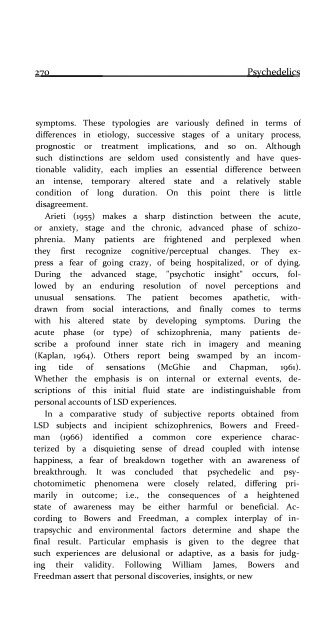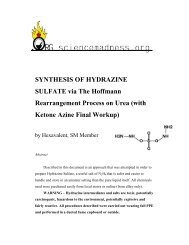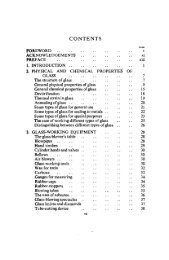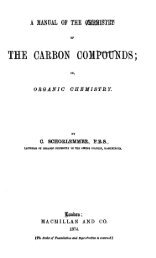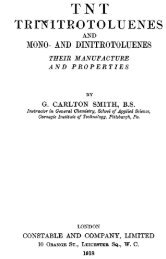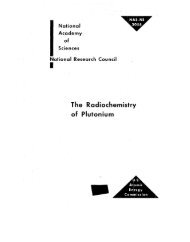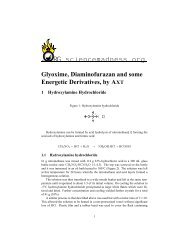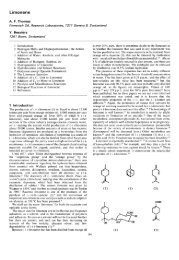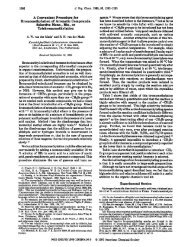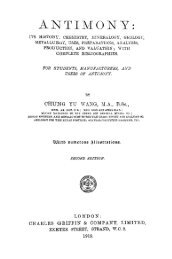- Page 1 and 2:
A736 $2.45 PSYCHEDELICS by Bernard
- Page 3 and 4:
P S Y C H E D E L I C S The Uses an
- Page 5 and 6:
Psychedelics The Uses and Implicati
- Page 7 and 8:
C O N T E N T S PART I. INTRODUCTIO
- Page 9 and 10:
3. Treatment of Alcoholism with Psy
- Page 11 and 12:
INTRODUCTION: PSYCHEDELICS, TECHNOL
- Page 13 and 14:
5___________ ______________________
- Page 15 and 16:
7___________ ______________________
- Page 17 and 18:
9___________ ______________________
- Page 19 and 20:
11___________ _____________________
- Page 21 and 22:
13___________ _____________________
- Page 23 and 24:
15___________ _____________________
- Page 25 and 26:
17___________ _____________________
- Page 27 and 28:
P A R T I I T H E N A T U R E O F T
- Page 29 and 30:
21___________ _____________________
- Page 31 and 32:
23___________ _____________________
- Page 33 and 34:
25___________ _____________________
- Page 35 and 36:
27___________ _____________________
- Page 37 and 38:
29___________ _____________________
- Page 39 and 40:
31___________ _____________________
- Page 41 and 42:
33___________ _____________________
- Page 43 and 44:
35___________ _____________________
- Page 45 and 46:
37___________ _____________________
- Page 47 and 48:
39___________ _____________________
- Page 49 and 50:
41___________ _____________________
- Page 51 and 52:
43___________ _____________________
- Page 53 and 54:
45___________ _____________________
- Page 55 and 56:
47___________ _____________________
- Page 57 and 58:
49___________ _____________________
- Page 59 and 60:
51___________ _____________________
- Page 61 and 62:
53___________ _____________________
- Page 63 and 64:
55___________ _____________________
- Page 65 and 66:
57___________ _____________________
- Page 67 and 68:
59___________ _____________________
- Page 69 and 70:
61___________ _____________________
- Page 71 and 72:
63___________ _____________________
- Page 73 and 74:
65___________ _____________________
- Page 75 and 76:
67___________ _____________________
- Page 77 and 78:
69___________ _____________________
- Page 79 and 80:
71___________ _____________________
- Page 81 and 82:
73___________ _____________________
- Page 83 and 84:
75___________ _____________________
- Page 85 and 86:
77___________ _____________________
- Page 87 and 88:
79___________ _____________________
- Page 89 and 90:
81___________ _____________________
- Page 91 and 92:
83___________ _____________________
- Page 93 and 94:
85___________ _____________________
- Page 95 and 96:
87___________ _____________________
- Page 97 and 98:
89___________ _____________________
- Page 99 and 100:
91___________ _____________________
- Page 101 and 102:
93___________ _____________________
- Page 103 and 104:
95___________ _____________________
- Page 105 and 106:
97___________ _____________________
- Page 107 and 108:
99___________ _____________________
- Page 109 and 110:
101___________ ____________________
- Page 111 and 112:
103___________ ____________________
- Page 113 and 114:
105___________ ____________________
- Page 115 and 116:
107___________ ____________________
- Page 117 and 118:
109___________ ____________________
- Page 119 and 120:
111___________ ____________________
- Page 121 and 122:
113___________ ____________________
- Page 123 and 124:
115___________ ____________________
- Page 125 and 126:
117___________ ____________________
- Page 127 and 128:
119___________ ____________________
- Page 129 and 130:
121___________ ____________________
- Page 131 and 132:
123___________ ____________________
- Page 133 and 134:
125___________ ____________________
- Page 135 and 136:
127___________ ____________________
- Page 137 and 138:
P A R T I V E F F E C T S O F P S Y
- Page 139 and 140:
131___________ ____________________
- Page 141 and 142:
133___________ ____________________
- Page 143 and 144:
135___________ ____________________
- Page 145 and 146:
137___________ ____________________
- Page 147 and 148:
139___________ ____________________
- Page 149 and 150:
141___________ ____________________
- Page 151 and 152:
143___________ ____________________
- Page 153 and 154:
145___________ ____________________
- Page 155 and 156:
147___________ ____________________
- Page 157 and 158:
149___________ ____________________
- Page 159 and 160:
151___________ ____________________
- Page 161 and 162:
153___________ ____________________
- Page 163 and 164:
155___________ ____________________
- Page 165 and 166:
157___________ ____________________
- Page 167 and 168:
159___________ ____________________
- Page 169 and 170:
161___________ ____________________
- Page 171 and 172:
163___________ ____________________
- Page 173 and 174:
165___________ ____________________
- Page 175 and 176:
167___________ ____________________
- Page 177 and 178:
169___________ ____________________
- Page 179 and 180:
171___________ ____________________
- Page 181 and 182:
173___________ ____________________
- Page 183 and 184:
175___________ ____________________
- Page 185 and 186:
177___________ ____________________
- Page 187 and 188:
179___________ ____________________
- Page 189 and 190:
181___________ ____________________
- Page 191 and 192:
183___________ ____________________
- Page 193 and 194:
185___________ ____________________
- Page 195 and 196:
187___________ ____________________
- Page 197 and 198:
189___________ ____________________
- Page 199 and 200:
191___________ ____________________
- Page 201 and 202:
193___________ ____________________
- Page 203 and 204:
195___________ ____________________
- Page 205 and 206:
197___________ ____________________
- Page 207 and 208:
199___________ ____________________
- Page 209 and 210:
201___________ ____________________
- Page 211 and 212:
203___________ ____________________
- Page 213 and 214:
205___________ ____________________
- Page 215 and 216:
207___________ ____________________
- Page 217 and 218:
209___________ ____________________
- Page 219 and 220:
211___________ ____________________
- Page 221 and 222:
213___________ ____________________
- Page 223 and 224:
215___________ ____________________
- Page 225 and 226:
217___________ ____________________
- Page 227 and 228: 219___________ ____________________
- Page 229 and 230: 221___________ ____________________
- Page 231 and 232: 223___________ ____________________
- Page 233 and 234: 225___________ ____________________
- Page 235 and 236: 227___________ ____________________
- Page 237 and 238: 229___________ ____________________
- Page 239 and 240: 231___________ ____________________
- Page 241 and 242: 233___________ ____________________
- Page 243 and 244: 235___________ ____________________
- Page 245 and 246: 237___________ ____________________
- Page 247 and 248: 239___________ ____________________
- Page 249 and 250: 241___________ ____________________
- Page 251 and 252: TABLE 1 243___________ ____________
- Page 253 and 254: 245___________ ____________________
- Page 255 and 256: 247___________ ____________________
- Page 257 and 258: 249___________ ____________________
- Page 259 and 260: 251___________ ____________________
- Page 261 and 262: 253___________ ____________________
- Page 263 and 264: 255___________ ____________________
- Page 265 and 266: 257___________ ____________________
- Page 267 and 268: 259___________ ____________________
- Page 269 and 270: 261___________ ____________________
- Page 271 and 272: 263___________ ____________________
- Page 273 and 274: 265___________ ____________________
- Page 275 and 276: 267___________ ____________________
- Page 277: 269___________ ____________________
- Page 281 and 282: 273___________ ____________________
- Page 283 and 284: 275___________ ____________________
- Page 285 and 286: P A R T V I N O N - D R U G A N A L
- Page 287 and 288: 279___________ ____________________
- Page 289 and 290: 281___________ ____________________
- Page 291 and 292: 283___________ ____________________
- Page 293 and 294: 285___________ ____________________
- Page 295 and 296: 287___________ ____________________
- Page 297 and 298: 289___________ ____________________
- Page 299 and 300: 291___________ ____________________
- Page 301 and 302: 293___________ ____________________
- Page 303 and 304: 295___________ ____________________
- Page 305 and 306: 297___________ ____________________
- Page 307 and 308: 299___________ ____________________
- Page 309 and 310: 301___________ ____________________
- Page 311 and 312: 303___________ ____________________
- Page 313 and 314: 305___________ ____________________
- Page 315 and 316: 307___________ ____________________
- Page 317 and 318: 309___________ ____________________
- Page 319 and 320: 311___________ ____________________
- Page 321 and 322: 313___________ ____________________
- Page 323 and 324: 315___________ ____________________
- Page 325 and 326: 317___________ ____________________
- Page 327 and 328: 319___________ ____________________
- Page 329 and 330:
P A R T V I I T H E R A P E U T I C
- Page 331 and 332:
323___________ ____________________
- Page 333 and 334:
325___________ ____________________
- Page 335 and 336:
327___________ ____________________
- Page 337 and 338:
329___________ ____________________
- Page 339 and 340:
331___________ ____________________
- Page 341 and 342:
333___________ ____________________
- Page 343 and 344:
335___________ ____________________
- Page 345 and 346:
337___________ ____________________
- Page 347 and 348:
339___________ ____________________
- Page 349 and 350:
341___________ ____________________
- Page 351 and 352:
343___________ ____________________
- Page 353 and 354:
345___________ ____________________
- Page 355 and 356:
347___________ ____________________
- Page 357 and 358:
349___________ ____________________
- Page 359 and 360:
351___________ ____________________
- Page 361 and 362:
353___________ ____________________
- Page 363 and 364:
355___________ ____________________
- Page 365 and 366:
357___________ ____________________
- Page 367 and 368:
359___________ ____________________
- Page 369 and 370:
361___________ ____________________
- Page 371 and 372:
363___________ ____________________
- Page 373 and 374:
365___________ ____________________
- Page 375 and 376:
367___________ ____________________
- Page 377 and 378:
369___________ ____________________
- Page 379 and 380:
371___________ ____________________
- Page 381 and 382:
373___________ ____________________
- Page 383 and 384:
375___________ ____________________
- Page 385 and 386:
377___________ ____________________
- Page 387 and 388:
379___________ ____________________
- Page 389 and 390:
381___________ ____________________
- Page 391 and 392:
383___________ ____________________
- Page 393 and 394:
385___________ ____________________
- Page 395 and 396:
387___________ ____________________
- Page 397 and 398:
389___________ ____________________
- Page 399 and 400:
391___________ ____________________
- Page 401 and 402:
393___________ ____________________
- Page 403 and 404:
395___________ ____________________
- Page 405 and 406:
397___________ ____________________
- Page 407 and 408:
399___________ ____________________
- Page 409 and 410:
401___________ ____________________
- Page 411 and 412:
403___________ ____________________
- Page 413 and 414:
405___________ ____________________
- Page 415 and 416:
407___________ ____________________
- Page 417 and 418:
409___________ ____________________
- Page 419 and 420:
411___________ ____________________
- Page 421 and 422:
413___________ ____________________
- Page 423 and 424:
415___________ ____________________
- Page 425 and 426:
417___________ ____________________
- Page 427 and 428:
419___________ ____________________
- Page 429 and 430:
421___________ ____________________
- Page 431 and 432:
423___________ ____________________
- Page 433 and 434:
425___________ ____________________
- Page 435 and 436:
427___________ ____________________
- Page 437 and 438:
429___________ ____________________
- Page 439 and 440:
431___________ ____________________
- Page 441 and 442:
433___________ ____________________
- Page 443 and 444:
435___________ ____________________
- Page 445 and 446:
437___________ ____________________
- Page 447 and 448:
439___________ ____________________
- Page 449 and 450:
441___________ ____________________
- Page 451 and 452:
443___________ ____________________
- Page 453 and 454:
445___________ ____________________
- Page 455 and 456:
447___________ ____________________
- Page 457 and 458:
449___________ ____________________
- Page 459 and 460:
451___________ ____________________
- Page 461 and 462:
453___________ ____________________
- Page 463 and 464:
455___________ ____________________
- Page 465:
457___________ ____________________
- Page 469 and 470:
PSYCHEDELICS AND THE FUTURE HUMPHRY
- Page 471 and 472:
463___________ ____________________
- Page 473 and 474:
465___________ ____________________
- Page 475 and 476:
467___________ ____________________
- Page 477 and 478:
469___________ ____________________
- Page 479 and 480:
471___________ ____________________
- Page 481 and 482:
473___________ ____________________
- Page 483 and 484:
475___________ ____________________
- Page 485 and 486:
477___________ ____________________
- Page 487 and 488:
P A R T X S P E C I A L S E C T I O
- Page 489 and 490:
481___________ Psychedelics of Expe
- Page 491 and 492:
483___________ ____________________
- Page 493 and 494:
485___________ ____________________
- Page 495 and 496:
487___________ ____________________
- Page 497 and 498:
489___________ ____________________
- Page 499 and 500:
491___________ ____________________
- Page 501 and 502:
493___________ ____________________
- Page 503 and 504:
495___________ ____________________
- Page 505 and 506:
497___________ ____________________
- Page 507 and 508:
499___________ ____________________
- Page 509 and 510:
501___________ ____________________
- Page 511 and 512:
503___________ ____________________
- Page 513 and 514:
505___________ ____________________
- Page 515 and 516:
507___________ ____________________
- Page 517 and 518:
509___________ ____________________
- Page 519 and 520:
511___________ ____________________


